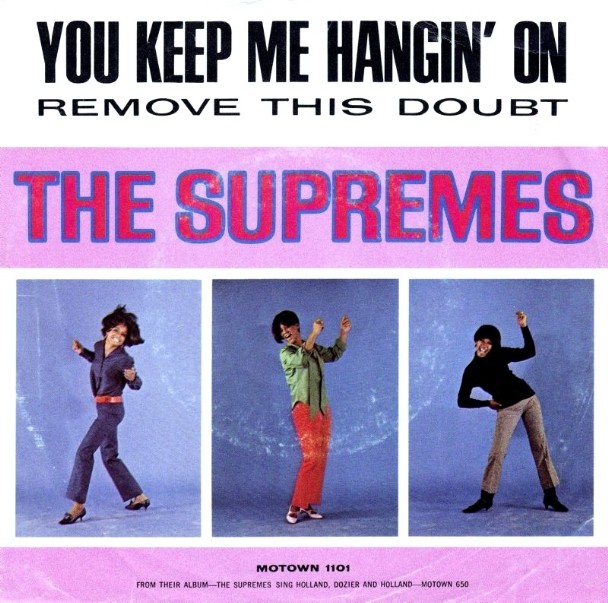November 19, 1966
- STAYED AT #1:2 Weeks
In The Number Ones, I'm reviewing every single #1 single in the history of the Billboard Hot 100, starting with the chart's beginning, in 1958, and working my way up into the present.
We tend to think of disco as a cultural blip -- as a brief and strange era where everyone wore silk shirts and bellbottoms and then immediately stopped once a bunch of yahoos blew up their records in a Chicago ballpark. But disco, as a musical genre, was an organic part of the pop-music continuum. It came out of the more rhythmic end of soul, and elements of it are still very much there in today's dance-pop. (Ariana Grande is, among other things, an elite-level disco diva.) From that perspective, then, disco existed long before people used the word "disco" to describe it. And from that perspective, maybe "You Keep Me Hangin' On" was the first disco #1.
You could just as easily, I suppose, argue that "Where Did Our Love Go" was the first disco #1. All of the Supremes' massive mid-'60s singles married sweeping, emotional lyrics about romantic travails to stomping and propulsive four-four beats, and that, after all, is a perfectly functional definition of disco. But "You Keep Me Hangin' On" cranked all those elements way, way up.
It's a brisk, urgent, desperate song, and it absolutely snaps into gear the second we hear that itchy morse-code guitar riff panning between speaker channels. And the hard snap of the Supremes' delivery -- "Go on! Get out! Get out of my life!" -- is pure disco. "You Keep Me Hangin' On" sounds easily 10 years ahead of its time, and listening to it, you can immediately hear why Diana Ross thrived in the disco era while so many of her '60s peers flailed.
"You Keep Me Hangin' On" was Holland-Dozier-Holland's attempt to write a rock song. Their take on the genre doesn't actually sound anything like '60s rock, but it's a whole lot better and more interesting than most of the actual rock songs of the era. The guitar, from Funk Brothers ace Robert White, is foregrounded, going back and forth between that ticcing intro and deep, resonant strums. The drums and percussion work together in lockstep, pushing forward the song's urgency. The bassline is another James Jamerson wonder, busy and complicated but never so showy that it detracts attention from the rest of the song. It's amazing that anyone in any era was able to put together a pop-song arrangement that strange and intuitive and gripping. That Holland-Dozier-Holland could do it with the limits of '60s recording technology is nothing short of miraculous.
But the arrangement wouldn't matter as much if it wasn't there to support such a motherfucker of a pop song. Here, Diana Ross sings with focus and determination and anger and desperation to the ex who's still stringing her along. She knows they're not getting back together, but she can't let go of the hope. And every time the ex comes around, acting all friendly, she goes through that heartbreak all over again: "You claim you still care about me / But your heart and soul needs to be free / Now that you've got your freedom / You wanna still hold onto me."
As the song builds, Ross' words go from plea to demand. She finds her fire and her confidence, and pretty soon she's ordering the dude to get the fuck out, talking to him like he's an obnoxious stray dog. It's a three-minute masterpiece of pop-music drama, tension and release working as one. Holland-Dozier-Holland parted ways with Motown soon afterward, only giving the Supremes one more #1 after "You Keep Me Hangin' On." As it turns out, the Supremes were fine without them. But listening to this, it's still hard not to wonder what might've happened if they'd stuck around, if their genius had even more time to develop within that peerless Motown thrill-delivery system.
GRADE: 10/10
BONUS BEATS: Here's Vanilla Fudge's heavy, slowed-down seven-minute psych-rock cover of "You Keep Me Hangin' On," which itself was a #6 hit in 1967:
https://youtube.com/watch?v=6CL8ASLVWPk
And here's the despair montage from the seventh season of Mad Men, set to that Vanilla Fudge cover:






